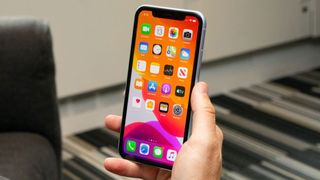Apple says the iPhone 12 will be delayed
The iPhone 12 delay means you shouldn't expect the phone in the usual September launch window

Good news: the iPhone 12 is launching soon. Bad news: it's going to be delayed by a few weeks launching later than Apple's normal September time frame.
The iPhone 12 delay, confirmed during Apple's latest earnings call, came at the same time the company reported positive news for Q3 2020. Despite the impact of the Covid-19 pandemic, iPhone sales were up 2% year-over-year, largely attributed to the iPhone SE 2020. Just like with this period, however, Apple cautioned that the atypical conditions meant Apple once again won't put an earnings target on Q4 2020.
The uncertainty also likely contributed to Apple's admission that the iPhone 12 will likely be delayed. During the earnings call, the company confirmed that iPad and Mac sales had double-digit growth despite supply restrictions caused by the impact of the coronavirus.
iPhone 12 delayed, but worth the wait?
The new iPhone 12 may be worth the wait. Apple is supposed to introduce the first 5G iPhone, offering faster download speeds in parts of the world that have access to 5G infrastructure. Almost all of Apple's Android-based rivals have 5G phones on sale – see the Samsung Galaxy S20, OnePlus 8 Pro and forthcoming Galaxy Note 20.
The iPhone 12 may offer more variety, too. Four iPhone 12 models are expected to launch with all-new designs, the souped-up A14 chipset, OLED display on all sizes, and, at the top end, 3D-capable triple-lens cameras.
Reasons for the iPhone 12 delay
When Apple delays an iPhone – or has limited availability – it's usually a supply chain issue. The iPhone X, which launched in October 2017, and the hard-to-find Jet Black iPhone 7 come to mind. There was a frenzy to find both in stock.
But the reason for the iPhone 12 delay may rest with external pressures. Apple CEO Tim Cook explained during the earnings call that many of the iPhone SE 2020 phones sold to consumers who had been waiting to upgrade from older devices. Customers may not be ready to upgrade their flagship mobile devices while stuck indoors and in the midst of economic uncertainty, and it's unclear how a cheaper iPhone released in the middle of the year could impact late-year flagship iPhone sales.
Get daily insight, inspiration and deals in your inbox
Get the hottest deals available in your inbox plus news, reviews, opinion, analysis and more from the TechRadar team.
Additionally, many of Apple's stores remain closed around the world, with several locations in the US having to re-close after temporarily re-opening in July. Apple CEO Tim Cook noted the impact this had on sales for existing devices.
"Store closures affecting the wearables and the iPhone" were already being seen, Cook said during the earnings call. He illustrated how people want to try on Apple Watch various bands to see how they fit. In other words, don't expect the Apple Watch 6 until you can try one on at a store near you.
- Our list as it stands: Best iPhone you can buy in 2020

